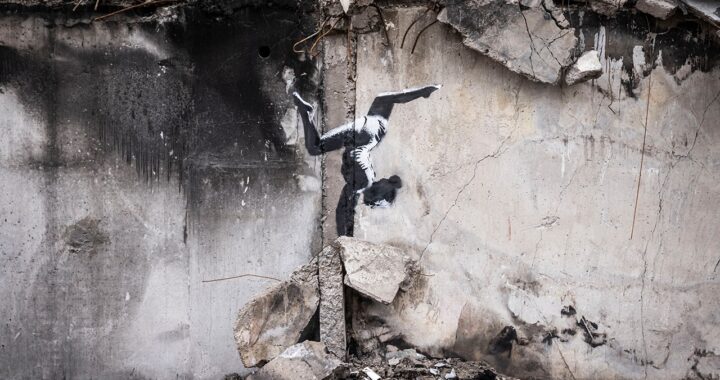The New York-based artist has been working on an unexpected series of paintings, each depicting uncannily dark skies, warping mountains and a car driving through.
Some of life’s best occurrences tend to happen on the off-chance. It could be that fleeting, spontaneous moment where you decide to go out for the evening, which turns out to be the best night out you’ve ever had; or maybe you say yes to an unexpected project and gain commissions off the back of it; or you go with the flow and just create for the sake of creating, which can produce amazingly unpredictable outcomes that wouldn’t have developed otherwise.
Eliot Greenwald, an artist born and raised in Portland, Maine, experienced this as he worked with some leftover paint from a project he’d signed off. On the mixing palette, he’d noticed a car and two planets, plus a gaping mouth that appeared to be swallowing the car. “I liked the painting and hung it on my wall,” he tells It’s Nice That, then showing it to a close friend of his, Mike Taylor, who immediately intervened with an entire mythological backstory to go with it. And that’s when the idea for the debut painting of his Night Car series began; a collection of paintings depicting transformative mountains, a flash-lit car, winding roads and a repetitively eery night sky.
“My first Night Car painting was unintentional,” he continues, noting how for a short while he’d avoided building on it with any concrete ideas. Then, he decided to “intentionally” make a drawing of what he saw in this first painting – a move spurred on after his girlfriend, Margot Bird, had seen it and asked if she could have it. “I place a lot of importance on intuition,” he says. “The intuitive responses for two artists who I admire so much, like Margot and Mike, were absolutely responsible for the conception of this series.” In fact, if he hadn’t experienced these two moments then he’s pretty certain that he would never have developed the series at all.
Eliot's gateway into the arts was a gradual and natural transition. He wouldn’t say that his childhood was particularly creative, but much of his family had an affection towards the industry in some form or another. His mother, for example, made clothes for the family, while his father played instruments. His sister painted, his grandfather built model boats, and his grandmother introduced him to “new parts of the natural world – like tide pools”. It was this encouragement that enabled Eliot to thrive in what he does now, a kind of creativity and curiosity that was nurtured from the get-go.
The artist, currently living in Brooklyn, New York, has exuded a strong likeliness for the uncanny throughout his work. From various sketches of ephemera and random compilations of things, Eliot’s also mastered the technique of sculpture, creating floating shoelaces and oddly shaped objects that appear almost cigarette-like. He’s also built a shelving system with handmade VCR tapes to match, not to mention a whole collection of spooky portraits painted with an array of earthy colours splurged on to the paper. When asked of his inspirations, Eliot responds that it’s never “neatly” answered. “When I think about all of the contributing factors that made significant impacts on me as a person or artist, I wind up overwhelmed. I have a hard time differentiating between the sound of snow falling at night in the woods and waiting on hold to speak to an operator about a disputed late fee. I generally believe that there isn’t a single element of my reality that isn’t influential or at least worthy of inquisition.”
Plucking ideas from all corners of life, Eliot’s process for his Night Car series begins with the canvas panels. Here, he’ll use a jigsaw to cut masonite into a mildly rectangle or square shape: “I think of their shape as once being geometrically precise, however they’ve eroded over time like the archaeological relics or sea glass,” he says. After this, he’ll build support stretcher bars and attach them to the back using glue and nails. He stretches his canvas over its entirety, staples it, and primes it with gesso. “The shape of my canvases are now directly taken from a previous painting series – a series I decided not to develop anymore. I painted over these old shaped canvases when I began painting Night Car simply because I had nothing else to paint on at the time.”
The canvas shape is yet another intuitive decision of Eliot’s, that undeniably seems to evoke a sense of warping surrealism alongside his spooky subjects. Expansive Tastes, for instance, revolves around the “mispronunciation of the phrase ‘expensive tastes’” – it features a splash of gold that trims the hills on the outskirts of the road. The Trickster in Between Two Farms was built using a paper bag to blend the green paint, and there’s even a piece of it stuck on the lower right section. Takin’ the Riverboat Out on Snake Lake was made in less than two hours, where the entire time Eliot would repeat the phrase ‘Takin’ the Riverboat Out on Snake Lake’ in his head. He’s not that sure why he did this, “but now there’s an entire show named after it”.
This solo show at Harper’s in New York opened on 14 January, and features a display of some of his series’ best. He also plans to hold his first London-based solo show later in the year at Taymour Grahne Projects, which will be an exciting event for the diary, all things considered. Most importantly, though, he has plans to keep expanding on the Night Car series and to incorporate various other paintings and sculptures alongside it, and a large-scale outdoors sculpture might be on its way sometime soon too.
Source: It's Nice That
Follow OK Mag on, Instagram for more news.





